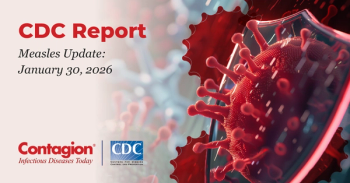
NIH Launches Trial Evaluating Second COVID-19 Booster Shots
One day after the FDA approved second booster shots for certain vulnerable populations, the National Institute of Health (NIH) announced they have begun enrolling adult US participants in a phase 2 clinical trial to evaluate a second COVID-19 booster dose.
Today, the National Institute of Health (NIH) announced they have begun enrolling adult US participants to test the safety and efficacy of a second
The study, called the COVID-19 Variant Immunologic Landscape (COVAIL) trial, is sponsored by NIH’s National Institute of Allergy and Infectious Diseases (NIAID).
The study announcement comes 1 day after the US Food and Drug Administration (FDA)
“We are looking beyond the Omicron variant to determine the best strategy to protect against future variants,” said Anthony S. Fauci, MD, director of NIAID and the chief medical advisor of the White House. “This trial will help us understand if we can use prototype and variant vaccines alone or together to shift immune responses to cover existing and emerging COVID-19 variants.”
The Pfizer-BioNTech and Moderna mRNA vaccines had 94.1% and 95% efficacy, respectively, against the original COVID-19 strain. However, vaccine efficacy wanes over time, and the Delta and Omicron variants demonstrated an unprecedented ability to cause breakthrough infections in vaccinated individuals.
When asked if a fourth COVID-19 vaccine dose was necessary, Pfizer CEO Albert Bourla
The COVAIL trial is looking to enroll 600 participants 18 years and older across 24 clinics. Participants will randomly be assigned 1 of 6 vaccine regimens:
- One 50-microgram (mcg) injection of the mRNA-1273 (Spikevax) prototype vaccine, which is the same vaccine currently authorized in the United States as a booster shot for adults
- One 50-mcg injection consisting of mRNA-1273.351 (an investigational vaccine targeting the Beta variant) and mRNA-1273.529 (an investigational vaccine targeting the Omicron variant)
- Two vaccinations administered two months apart: each vaccination is one 50-mcg injection containing both mRNA-1273.351 and mRNA-1273.529
- One 50-mcg injection consisting of mRNA-1273.617.2 (an investigational vaccine targeting the Delta variant) and mRNA-1273.529
- One 50-mcg injection of mRNA-1273.529
- One 50-mcg injection consisting of mRNA-1273 (Spikevax) and mRNA-1273.529
The COVAIL trial seeks to gather data on the immune responses elicited by prototype vaccines and variant vaccine candidates. They are including bivalent vaccines, targeting 2 different COVID-19 variants, to improve booster shot recommendations. NIAID said they are “preparing for the possibility of future variants evading protection against currently available COVID-19 vaccines.”
The first stage of the COVIAL trial is currently being conducted in collaboration with Moderna, Inc., with the eventual goal of expanding to include more participants and test multiple COVID-19 variant-specific vaccines. Participants will be monitored for symptoms and adverse events after vaccination, giving blood samples throughout a 12–14-month study period.
For more information about the impending trial, including how to enroll, visit ClinicalTrials.gov and search for the identifier
Newsletter
Stay ahead of emerging infectious disease threats with expert insights and breaking research. Subscribe now to get updates delivered straight to your inbox.

































































































































